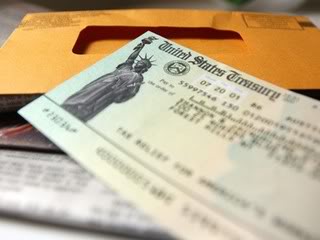The government’s Economic Stimulus Plan has been in the news a lot lately, and the $168 Billion package is intended to jumpstart the economy by distributing tax rebates that should be arriving in your mailbox as early as spring. The question is: what should you do with your rebate check? The info below can help you estimate how much you’ll receive, consider your options, and start planning now so you’re prepared.
HOW MUCH MONEY WILL YOU RECEIVE?
The amount you receive ultimately depends on how much you make. For instance, individuals with adjusted gross incomes up to $75,000 will receive a rebate check of $600. If you’re married filing jointly and earn up to $150,000, you can expect to receive $1,200. Those who earn at least $3,000 but don’t pay taxes will receive about half as much–$300 for individuals or $600 for married couples filing jointly.
If you make more than $75,000 as an individual or $150,000 as a married couple, your rebate check starts to shrink. That doesn’t mean you’re out of luck… most high-income taxpayers will still receive a check. But you can plan on receiving $50 LESS for every $1,000 you earn over those limits.
Finally, if you have children, you can expect to receive a $300 credit for each child.
SO…WHAT SHOULD YOU DO WITH YOUR REBATE?
Do Nothing…At Least for Now–Don’t start mentally spending those dollars just yet. At the minimum, you should hold off until you file your 2007 tax return. That’s because the gross income listed on your 2007 return will actually determine how much you’ll receive. And unless you absolutely need to, try not to spend the money at all until you have it in hand. Too often, we make purchases on the credit card or with money from savings with the intention of paying it back…only to have some other expense come up in the meantime. To avoid falling into this trap, make a commitment to yourself to wait for the check to arrive before you spend it.
Don’t Overspend–Regardless of how much you receive, make a budget and stick to it. We all know how easy it is to go to the store with a specific amount in mind, only to walk out over budget. In this case, not only could you end up spending your entire rebate check, but may actually come out negative by spending additional money that could be budgeted for your regular bills.
Consider NOT Spending At All–The government is issuing these tax rebates with the hope that Americans will help bolster the economy by spending it. However, “spending” isn’t always the best plan. If you have high-interest credit cards or other loans, use the rebate to help pay down the debt…and get out from underneath those payments sooner! If your debt load isn’t very high, consider saving the rebate check in an interest-bearing account, funding or starting a college savings plan, or even putting the money in a retirement account that will earn you more and more money as time goes on.
The Economic Stimulus Plan features a number of benefits you may not be aware of. In addition to rebate checks, it includes new conforming loan limits that may allow you to refinance and save money every month, or purchase a home more affordably. If you have any questions about your overall financial picture and how you can make the most of this opportunity, please call today. Remember… a little planning goes a long way!
Patrick Dunn, Westwood Mortgage Inc. & MMG Weekly
patrick@westwoodmortgage.com / http://www.certifiedplanning.com/
